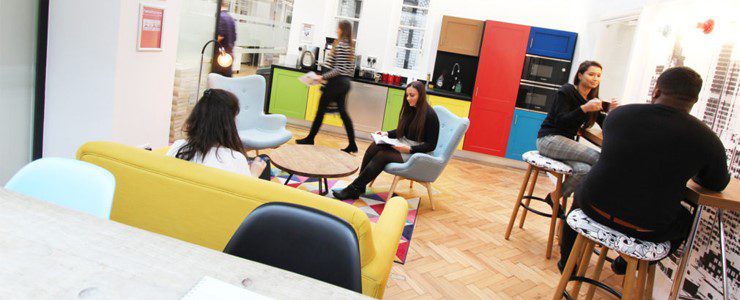
Why coworking is perfect for the tech industry
Coworking spaces make a lot of sense for today’s tech startups. You can do the same workplace activities that a traditional office accommodates, but without the high rent and utility overheads.
In the current economic climate, using a coworking space is a good option for all types of business, but particularly for those in the tech industry.
A fast-moving industry, it is advancing rapidly and extremely competitive. Employees need to be continually performing at their best.
There are all sorts of amenities, office equipment, flexible features and perks in coworking spaces that will meet the needs of any tech startup. The environment also lends itself to convenient collaboration in a way that a traditional office can’t match and often, working from home implies various distractions, whether that be the dog, young children or noisy neighbours.
How does coworking help networking?
While the cubicle walls of a traditional office suit some sectors and tasks, they’re not ideal for a group of specialised professionals who prefer bouncing ideas off each other.
Networking with fellow co-workers means individuals can combine their unique skillsets towards a specific team goal.
There will be sufficient space for your team to work in the shared areas, while private meeting rooms will be at your disposal for confidential matters. So, the best of both worlds!
What amenities can you expect?
Tech workers are no different from anyone else, in that they expect certain amenities.
For tech workers, the standard of the IT provision such as a fast broadband connection, reliable WiFi, a high-quality printer, podcasting facilities and other perks can be make or break.
The problem with a traditional office is that tech gear doesn’t come cheap, and a startup can soon find itself over budget as it strives to keep up with the latest innovations. Choosing a coworking space means spending less to keep ahead of the game.
WiFi is provided usually at no extra cost, while the layout and amenities make it easy to switch seamlessly from working solo to bursts of collaboration.
Mental health and wellbeing
The flexibility of coworking spaces can help improve mental health and wellbeing. Stress and mental health issues impact every industry, but the tech sector stands out because of its unusually high stress rate.
Tech workers are five times more likely to suffer from depression than the average UK worker, according to research carried out by British Interactive Media Association for its Tech Inclusivity and Diversity Report. The study reveals 52% of tech workers have had depression, anxiety or both at some time during their career.
Data analysts, software engineers, developers and product managers need problem-solving skills and analytical thinking to carry out their duties. Combined with the fast-paced nature of tech companies, this can cause additional stress that can negatively impact mental health.
The research has found some feel isolated and exhausted, with difficult projects becoming a “burden”. Tech workers can feel they don’t have any control over their workload. They tend to work longer hours to finish off challenging tasks, which can also contribute to the high stress rate. This leads to mistakes on the job and more sick days. Some feel their goals are unrealistic, as they become bogged down by difficult projects.
Health experts recognise our mental health is just as important as our physical wellbeing. This is where coworking comes in as an antidote to excess stress. A supportive working environment goes a long way towards alleviating the symptoms.
Flexible working reduces stress
Recent research suggests flexible working practices can help reduce feelings of stress and anxiety. People who work flexible hours have experienced a reduction in chronic stress, according to studies published by Understanding Society.
UK workers who make the most of flexible working arrangements suffer less anxiety than their peers who don’t enjoy the same option. The study concluded there was a direct link between stress and inflexible working hours.
Working flexibly can also help people to get their work/life balance right – another important factor in reducing stress. People who work long hours on a regular basis feel like they’re missing out on their home life. Studies have found this is the case with workers who have children.
A coworking space enables employees to spread out their workload into a manageable schedule. This can include working longer hours some days to enable more time off for a long weekend. It can also include simply taking an afternoon off if you’re feeling burnt out. You will be able to separate your personal life from your professional life.
Employees in the tech industry often prefer to work outside the normal 9-5. They may be developing a new innovation or having a meeting with a client outside regular business hours. Coworking accommodates whatever hours they choose to work.
Where are the UK’s most popular coworking spaces?
The flexible workplace sector is growing all the time, with an estimated 6,000 coworking spaces across the UK, covering around 85 million square feet.
Since the Covid pandemic and lockdowns, demand for flexible workspaces is on the rise again. As the hub of the UK’s coworking space, London is driving the sector forward. Research by the Instant Group in 2022 revealed a 23% increase in demand in the capital, which has been dubbed the UK’s flexible working hot spot.
Regional growth is particularly strong in England’s northern cities, with coworking space in Manchester and Leeds offering competitive desk prices that attract plenty of start-ups.
Demand for coworking space in Birmingham has remained steady, with analysts predicting it’s likely to grow in 2023. This vibrant city is fast becoming the in place for tech start-ups.
Birmingham’s tech sector is “booming”, according to Seedtable, which lists 34 start-ups to watch out for, ranging from small creative ventures to hyper-growth scale-ups and everything in between.
The growth of coworking space in Southampton has helped the City Council to be recognised as the most “Future Ready” in the south-central region. The port city prides itself on offering support for local businesses and a chance for local talent to be retained and develop new skills.
Industry experts suggest coworking and the tech industry will both continue to expand, with the growth of new tech start-ups driving the need for new flexible workspaces.
© ViDI Studio / Shutterstock.com


![Headspace-©-sirtravelalot-Shutterstock.com_[1]](https://www.headspacegroup.co.uk/wp-content/uploads/2020/11/Headspace-©-sirtravelalot-Shutterstock.com_1.jpg)
